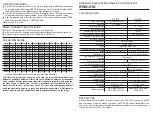
•
The maximum error of the last used synchronization message
•
The time since the last used synchronization message
•
The rate accuracy of the internal clock in the function.
17.2.8.2
Real-time clock (RTC) operation
The IED has a built-in real-time clock (RTC) with a resolution of one second. The
clock has a built-in calendar that handles leap years through 2038.
Real-time clock at power off
During power off, the system time in the IED is kept by a capacitor-backed real-time
clock that will provide 35 ppm accuracy for 5 days. This means that if the power is off,
the time in the IED may drift with 3 seconds per day, during 5 days, and after this time
the time will be lost completely.
Real-time clock at startup
Time synchronization startup procedure
Coarse time synchronization is used to set the time on the very first message and if any
message has an offset of more than ten seconds. If no FineSyncSource is given, the
CoarseSyncSource is used to synchronize the time.
Fine time synchronization is used to set the time on the first message after a time reset
or if the source may always set the fine time, and the source gives a large offset
towards the IED time. After this, the time is used to synchronize the time after a spike
filter, i.e. if the source glitches momentarily or there is a momentary error, this is
neglected. FineSyncSource that may always set the time is only IRIG-B.
It is not recommended to use SNTP as both fine and coarse synchronization source, as
some clocks sometimes send out a bad message. For example, Arbiter clocks
sometimes send out a "zero-time message", which if SNTP is set as coarse
synchronization source (with or without SNTP as fine synchronization source) leads
to a jump to "2036-02-07 06:28" and back. In all cases, except for demonstration, it is
recommended to use SNTP as FineSynchSource only.
Rate accuracy
In the IED, the rate accuracy at cold start is 100 ppm but if the IED is synchronized for
a while, the rate accuracy is approximately 1 ppm if the surrounding temperature is
constant. Normally, it takes 20 minutes to reach full accuracy.
Time-out on synchronization sources
All synchronization interfaces has a time-out and a configured interface must receive
time-messages regularly in order not to give an error signal (TSYNCERR). Normally,
the time-out is set so that one message can be lost without getting a TSYNCERR, but
if more than one message is lost, a TSYNCERR is given.
1MRK 504 135-UEN A
Section 17
Basic IED functions
569
Technical manual
Summary of Contents for ret650
Page 1: ...Relion 650 series Transformer protection RET650 Technical manual ...
Page 2: ......
Page 40: ...34 ...
Page 62: ...56 ...
Page 84: ...78 ...
Page 208: ...202 ...
Page 376: ...370 ...
Page 414: ...408 ...
Page 530: ...524 ...
Page 562: ...556 ...
Page 620: ...614 ...
Page 668: ...662 ...
Page 669: ...663 ...
















































